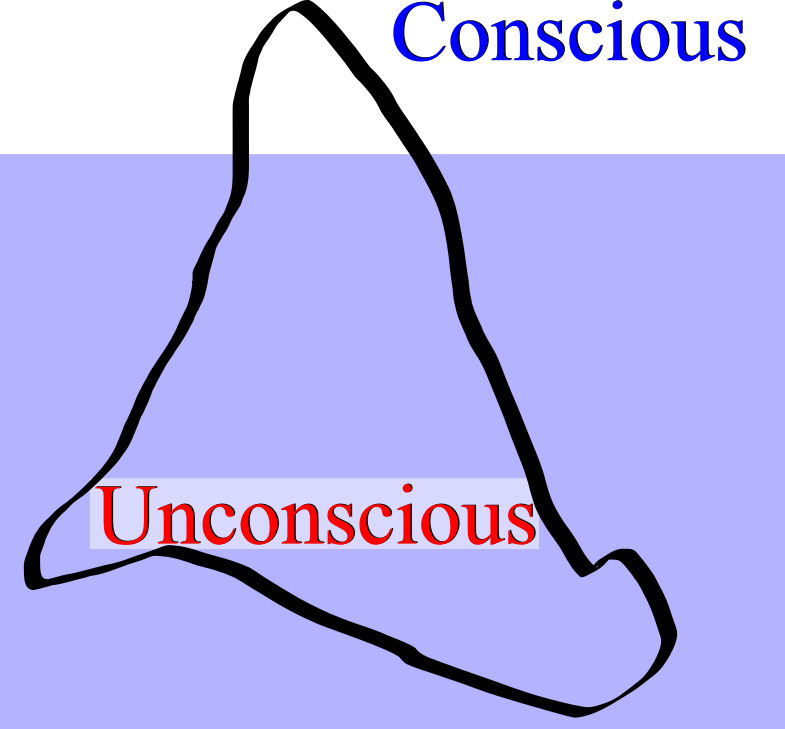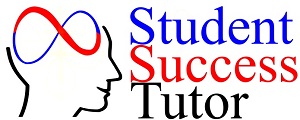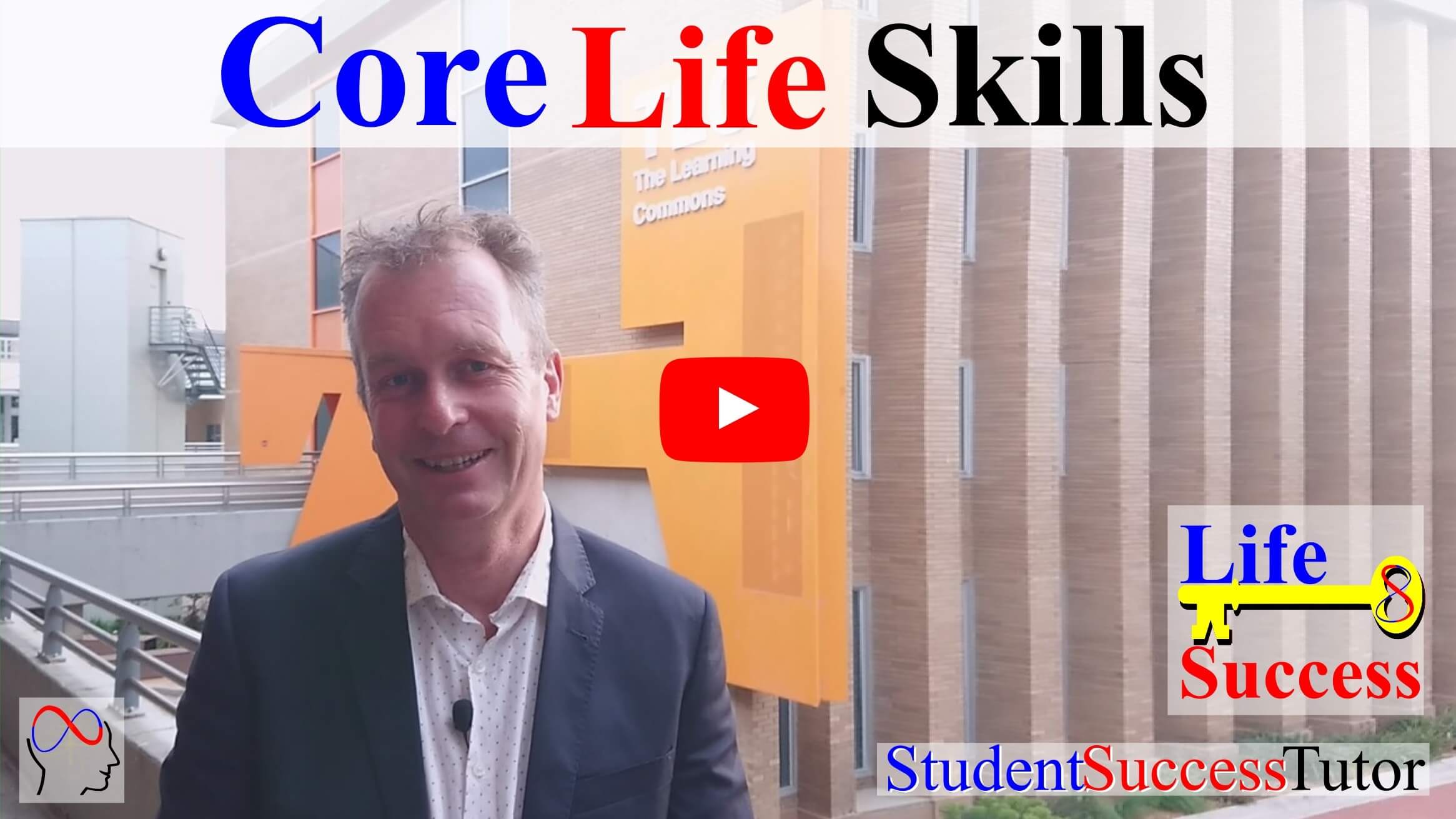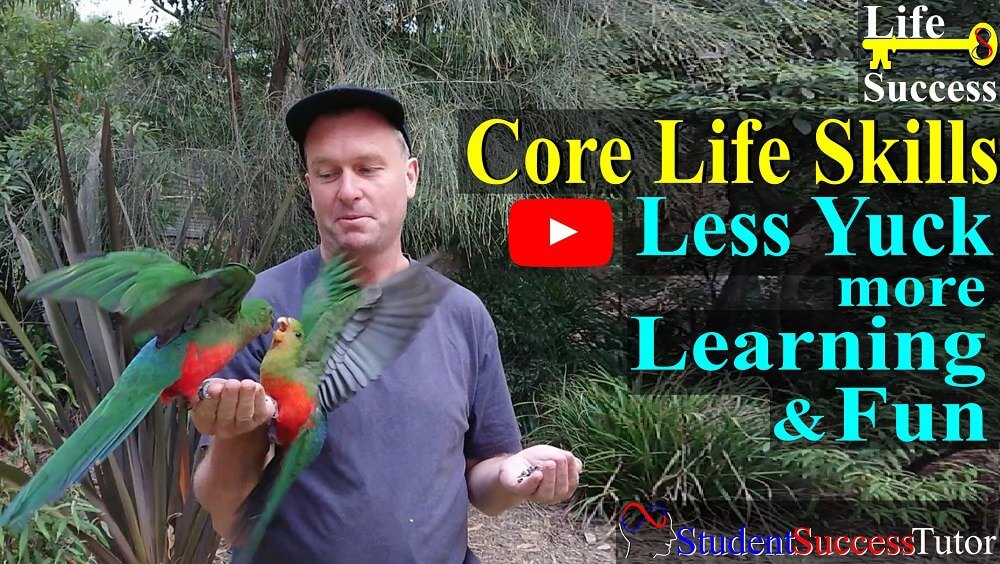Core Life Skills
the foundation of Learning & Life Success!
Two critical skills will transform a person's learning and academic performance. They are the concrete foundation upon which the metaphorically the skyscraper of learning and life is built. Life is hard and falls to bits if this foundation isn't solid. These are classified as Life Skills in this website and service because they impact all areas, not just academic results. This will also develop other core life skills such as emotional intelligence, motivation, self-care and more. These life skills will build a foundation that will support a 200 story building, not a one story townhouse.
These easy to use techniques develop skills that transform a person if practiced.
What is your unconscious mind?
The Key to life success in any area
These core life skills enhance cognitive, emotional and body responses. These are foundational operations of being a human to live. This is why they are named Life Skills. Typically these are not taught in education systems unless one is training to be a high performance athlete. People seem oblivious to their importance. Unless these are practiced and honed they remain an unconscious function. The problem with it being an unconscious operation is that it gets corrupted by life and the development of bad habits. The corruption process is discussed on the unconscious mind page. Our conscious mind needs to be the parent and caretaker of our 5 year old best friend that is our unconscious mind.
Top performers in any area be that academic, sport, career, the arts and also parenting (for example) put time and effort into developing these skills in some way. World leading athletes like Roger Federer and Serena Williams focus on these skills extensively with expert help. Any top performer in any endeavour tends to research or have coaching on these core skills.
My conclusion after three decades of research and application in the fields of human potential, learning, performance, change techniques, training methodologies as well as leadership development is this:
Two core life skills will transform any person's life if used, practiced and developed.
1. State Awareness
2. Using the Learning State
These two skills will transform any student's academic pursuit and later career to a whole new level. What is truly brilliant about these skills is that they develop all areas of a person. I call these Meta skills, that is they are the basis or prerequisite (ie: step 1) of many skills being performed better. If these two skills alone are developed they have a massive impact on many areas of a person's life.
State awareness is the placement of conscious volitional attention. Directing your attention by choice is used to gauge your internal mental, emotional and physical state. This gives a person the ability to be consciously at choice. Without State Awareness habits run the person. This means that negative emotions hijack behaviours and reactions occur, not responses. Note the difference, this is extremely important.
Once the internal state is evaluated consciously it can be tuned into a more resourceful state to give the best action and response in any situation. The most optimal state is one where all the neurology is activated so the unconscious mind can give the best actions, thoughts and performance. This optimal state is defined here as the Learning State. The Learning State in this website is beyond the typical learning alpha brainwave state that Accelerated Learning (Colin Rose) and other advanced educational pioneers talk about. The Learning State as taught here is a full body and neurology activation skill, not just a relaxation process that activates only the brain.
The initial focus here is learning and motivation to improve grades as the outcome. The rest of a student's life will then improve as the correct habits grow.
The two meta life skills then give you the ability to use your unconscious mind's resources and abilities. If you do not use your unconscious mind correctly then you are just using the 'tip of the iceberg'. This has serious implications for study and life such as:
If you do not use your unconscious mind correctly then you are just using the 'tip of the iceberg'. This has serious implications for study and life such as:
85% to 97% of anybody's potential is untapped (the blue part in the water as illustrated in the picture to the left).
Learning, concentration and performance are massively reduced.
People are run by bad habits and unpleasant emotions. They are a slave to their emotional baggage and emotions.
People are controlled by external influences, as they have no capacity to notice how they operate.
Behavioural flexibility is seriously reduced. Reactions tend to be the habit rather than a conscious considered response.
These people tend to be miserable, depressed or angry, as the natural happiness and joy are lost under their unconscious garbage.
To use and master State Awareness and the Learning State gives you full access to your neurology and everything that the unconscious mind does. Simple life skills can totally transform a person, their studies, motivation and self-esteem. It puts you back in control. All the above negative outcomes can be reversed with application of the skills taught here. It does require practice and diligence but the rewards are a much happier and successful life. Getting better grades is the aim here, but so much more is the result.
Metaphorically speaking these two meta life skills then provide the petrol and a Ferrari to get you where you want to go. They are merely tools that become a habitual skill. Learning how to use your unconscious mind is the driver's license of life. When you know these then you are ready to head to that life you actually want in style and speed. Otherwise you'll be left walking in the rain with the others that don't have these skills. The majority of people have no idea how to use their unconscious mind and communicate with it. As a result, their life is spent walking in the rain every day because they don't know they have a choice.
The coaching process here gives you your driver's license. Buckle up, it's time to turn the Ferrari's engine on and start driving life where you want it to go!
To read and watch more go to the unconscious mind page.
Life Skills explained for Students
to see how habit and instinct runs us with parrots demonstrating
This fun video demonstrates the principles of these life skills. My Learning State helps me to manage and have the birds feel safe with me. They even show they understand English and will follow instructions sometimes. Note the start of the video and my sentence. Listen to how I speak to the bird. I am speaking 'to my best friend who is 5 years old' (my inner me) as I like to in the unconscious mind page.
It's hard to believe it is a wild baby bird going by what it does (amazing). It is obvious I am in the Learning State and beaming joy and caring. When they bite my ear I don't overreact. I use the State Awareness exercise to get out of the yellow traffic light 'pain state' and instantly go back to the green traffic light state. These squabbly noisy birds are young fledglings. They demonstrate unconscious behaviour very nicely. These young birds bite me as they are learning about their environment, the adult birds won't bite like that.
emotional intelligence
Why is 'EQ' so important?
How you are feeling is the most important thing you have after meeting the basic survival needs of food, warmth and shelter. How you feel impacts concentration, learning, conduct and performance in any activity. If you feel neutral, OK or good you will do all of these things much better. If you are emotional then it isn't nice. Being emotional creates stress, distraction and tension. It impacts performance and health.
The difference between a feeling and an emotion is defined on the emotional intelligence page. To know the difference is important. In summary, the difference is a feeling is natural and typically peaceful or nice to experience. An emotional state is typically unpleasant and it is a message to grab our attention.
So the question then becomes 'how do I feel better more of the time?' The answer is again, using the two core life skills of 1. State Awareness to gauge what is going on and then 2. entering the Learning State (Whispering State). This lays the base of turning on the whole neurology so the unconscious mind can give you the best outcome.
The rules of the unconscious mind, also known as the prime directives, explain how emotions are used or suppressed (etc) by the unconscious. This is how we are designed neurologically and unconsciously to operate so life is good and easeful. These are the two prime directives that the unconscious mind works towards. The first is minimal energy expenditure which ensures survival (evolutionary drive) and to feel good which means no stress (and thus less energy expenditure)!
All animals aim to meet these two objectives, of minimal energy expenditure and feeling good. Even high-energy animals like the hummingbird tailor their behaviours to save energy, but they need lots of high energy food to live. This impacts their behaviours drastically. Watch a cat, they are the masters of these two prime directives. A cat is extremely lazy and they will only do what pleases themselves. Cats only 'give' when they want affection, but they never stroke you back do they?
How do you get rid of an emotion? You need to consciously be aware of it and let be experienced to find out what its message is. If you hold the Learning State for long enough your emotions will shift. The unconscious mind will process and release the emotion. Next a natural feeling will arise. How quickly an emotion subsides depends on many factors, but if these skills are used they will shift much faster. There are ways to process an emotion consciously with the Learning State. This gives optimal access to the neurology so the emotion is processed faster.
This topic is discussed further in the emotional intelligence page.
Emergencies & Pain
The tough stuff & surviving it
The two core life skills of State Awareness and the Learning State give the capacity to activate all of the body's neurology, physiology and mental capacities. Relating to the unconscious mind correctly develops behavioral competencies and the ability to grow significantly as a human being. Relating to the unconscious mind correctly can be described simply as treating it like a 5 year old best friend (or brother/sister).
Understanding and working in accordance with the prime directives of the unconscious mind can also be used to further develop this capacity. These help teach us how to relate to ourselves. As mentioned above this then develops emotional intelligence. A capacity grows to handle strong emotions and give clear responses when emotions are happening.
These skills and understanding also naturally give the ability to properly process emotions internally. Emotions are then treated as messengers. Deciphering the message is then undertaken and the emotion is felt and not resisted. A helpful response is given to the emotions. This stops emotions from being suppressed and recycled later as emotional baggage and bad behaviour.
Using and practicing these four skills/abilities develops the person into a competent functional adult. This means tough situations can be handled with conscious responses and calmness. This gives the person the ability to handle the tough stuff that happens in life. Emergency situations, pain, pandemics and dramatic events can be handled with full conscious functionality. This can result in full conscious responses in life-threatening events. This can save your life. Rather than dysfunction, the correct actions required at the time can be carried out with cognitive clarity.
That means pain can be handled in such a way that healing happens the fastest. It gives the person the ability to be with pain while minimising mental suffering. The suffering is the urge to get away from the pain. When these skill sets are embedded as a habit by the unconscious mind they naturally assist in these situations that nobody likes to be in.
The outcome of these four skillsets when honed and practiced so they are a habit give life outcomes to assist a person and the people around them. On the emergency response and pain page I explain from personal experience the difference this can make.
Remaining functional in an emergency is a very valuable ability to have. It also makes life more bearable in times of distress, pain and unfortunate circumstances.
Success Journal
The habit and evidence of improvement
The success journal is included here under life skills as it is a very simple method for recording and reflecting on what has been learned. It's a great tool for setting goals, tracking progress and much more. It also helps to empty the backlog of un-filed clutter in the unconscious mind as it gives context so memories can be stored correctly. This then helps clarity and performance. The journal is like a vacuum cleaner to clear the mind and thinking processes.
It also helps with whole-brain learning and life context. The success journal acts like a big overview. This engages the right side of the brain so the bigger picture of one's life can be understood and contextualised.
This is the place where the activities and feedback results from using the above skill sets are recorded. This is explained fully on the success journal page. The journal is an integral aspect of tutoring for the feedback process to become a habit.
Life Skill Summary
The life skills mentioned above are the instruction manual for being a successful and happy person. It gives a person the natural skills and habits to enjoy the good times and manage resourcefully the harder events. These harder events strengthen and deepen the person as they grow in wisdom and experience to make life better moving forward.
The skills apply to people of all ages, from age eight upwards. The sooner these life skills become the default habit the easier it is for that person to achieve what they want with minimal internal resistance. This is because the unconscious mind has less baggage due to fewer years of collecting it. For those younger than eight, the parents can model these and give helpful suggestions. These younger children will then just absorb these skills as habits with little effort. The younger the child is the more unconscious they are, hence why they learn so much so easily at that age.
Mastering your Life Skills
These skills develop in an order
The pages in this life skills drop-menu take you through the journey in the order in which they happen to maximize academic and life success. This is the order:
1. State Awareness: Learning is state dependent. Our neurology's functionality is determined mostly by our internal state, typically by how we are feeling. Therefore it is important to firstly know what feeling or emotional state we are in. This is accomplished by doing the State Awareness traffic light exercise.
2. State maximisation: Once the current state of being is known consciously it can be shifted to a better one. The best state is the Learning State, by definition of what it is, full activation of the brain and body neurology. This is the beauty of this methodology and the 9 pillar framework. The Learning State will open up joy, happiness and a deep connection with life.
My capacity to work with the animals and the obvious joy it gives me proves this. But I also hold these joyful and peaceful states when working in toxic bully-loaded corporate environments. I naturally hold this state of consciousness in any situation. I hold this state even when I am experiencing strong emotions. The Learning State is my permanent default setting, as the habit is now unconscious and automatic. Per the prime directives, this setting is chosen because it expends less energy than being stressed, and it feels good. We are naturally programmed this was in our DNA and unconscious mind's prime directives if we remove the bad habits.
State Awareness and the Learning State are pillar No1 in the 9 pillar framework for this reason. Master pillar No1 and the other 8 pillars will be a natural outcome. The other 8 pillars play the role of assessing and applying the Learning State correctly.
3. The unconscious mind: This page is third as it gives the understanding and rules to achieve steps one and two above. This is pillar No5 in the framework. Learning how to communicate and follow the rule book of your unconscious mind will enhance steps one and two above. This helps the habit become more regular and reliable. For the keen person who wants to explore and really master learning, success and happiness this page also discusses the prime directives, the actual operation manual for the unconscious mind.
4. Emotional intelligence: This is then improved as a side benefit. Feeling OK or good then becomes more common. This improves relationships and sorting out issues with people and within yourself. The natural harmony that is happening inside the unconscious then helps us be responsive rather than reactive when emotions are running. This then adds a feedback loop within the unconscious mind's operation. The feedback spiral to greater resourcefulness and happiness starts.
5. Emergencies and pain: Unpleasant and unwanted life events happen to us all. Mastering the above can save your life in extreme events as it helps you function properly. It also helps with unpleasant occurrences like pain. To enter the Learning State in extreme circumstances is a sign that these core skills are becoming a natural neurological response as a deep habit. At these times these skills are worth their weight in diamonds.
6. The success journal: The practice of taking notes re-affirms all the above. Journaling also helps the unconscious mind to reflect, process and de-clutter. It's also a great resource when things get tough. Past experiences and stories can help contextualise current events and give solutions. The success journal just adds to these life-affirming skills that become habits to make study and life better.
If a simple approach is wanted, the two core life skills will give the bulk of the benefits for learning and the rest of life. The power of these two skills if turned into a habit by practice is well worth the effort.
Coaching focuses on these as the base for the whole-brain study skills to be added.
Book a session now. Let's discuss an action plan
Individual online tutoring is limited to 12 students a week.
Book here. World-wide online.


